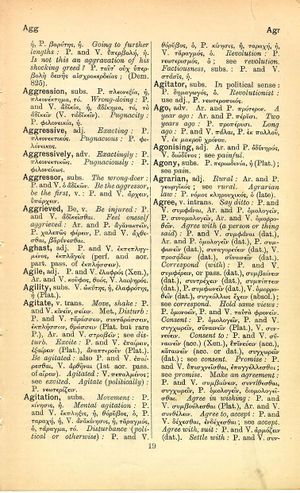agitator: Difference between revisions
Ἀδώνι' ἄγομεν καὶ τὸν Ἄδωνιν κλᾴομεν → We conduct the rites of Adonis, we weep for Adonis (Pherecrates, fr. 170)
(D_1) |
(Gf-D_1) |
||
| Line 1: | Line 1: | ||
{{Woodhouse1 | {{Woodhouse1 | ||
|Text=[[File:woodhouse_19.jpg|thumb|link= | |Text=[[File:woodhouse_19.jpg|thumb | ||
|link={{filepath:woodhouse_19.jpg}}]]'''subs.''' | |||
<b class="b2">In political sense</b>; P. [[δημαγωγός]], ὁ. | <b class="b2">In political sense</b>; P. [[δημαγωγός]], ὁ. | ||
Revision as of 07:22, 14 August 2017
English > Greek (Woodhouse)
subs.
In political sense; P. δημαγωγός, ὁ.
Revolutionist: use adj., P. νεωτεροποιός.
Latin > English (Lewis & Short)
ăgĭtātor: ōris, m. id., pr.
I he that puts a thing in motion; used exclusively of those who drive animals (asses, horses, etc.), a driver (cf. agaso): agitator aselli, poet. for a peasant, Verg. G. 1, 273: equorum Achillis, i. e. the charioteer, id. A. 2, 476: sustineat currum ut bonu' saepe agitator equosque, Lucil. p. 154 Müll.—Hence,
II Esp., a charioteer, a combatant in the games of the circus, Plaut. Men. 1, 2, 50: ego ut agitator callidus, priusquam ad finem veniam, equos sustinebo, Cic. Ac. 2, 20; Suet. Calig. 55; so Inscr. Orell. 2593 sq.: agitatores consopiti sunt, Vulg. Nah. 2, 3.
Latin > French (Gaffiot 2016)
ăgĭtātŏr,¹³ ōris, m. (agito),
1 conducteur de chars [dans les jeux publics] : Cic. Ac. 2, 94 ; Sen. Ep. 30, 13 ; Plin. Min. Ep. 9, 6, 2 ; [d’un char de guerre] Virg. En. 2, 476 ;
2 celui qui pousse devant lui du bétail : tardi agitator aselli Virg. G. 1, 273, le paysan qui pousse son âne à la marche lente.

